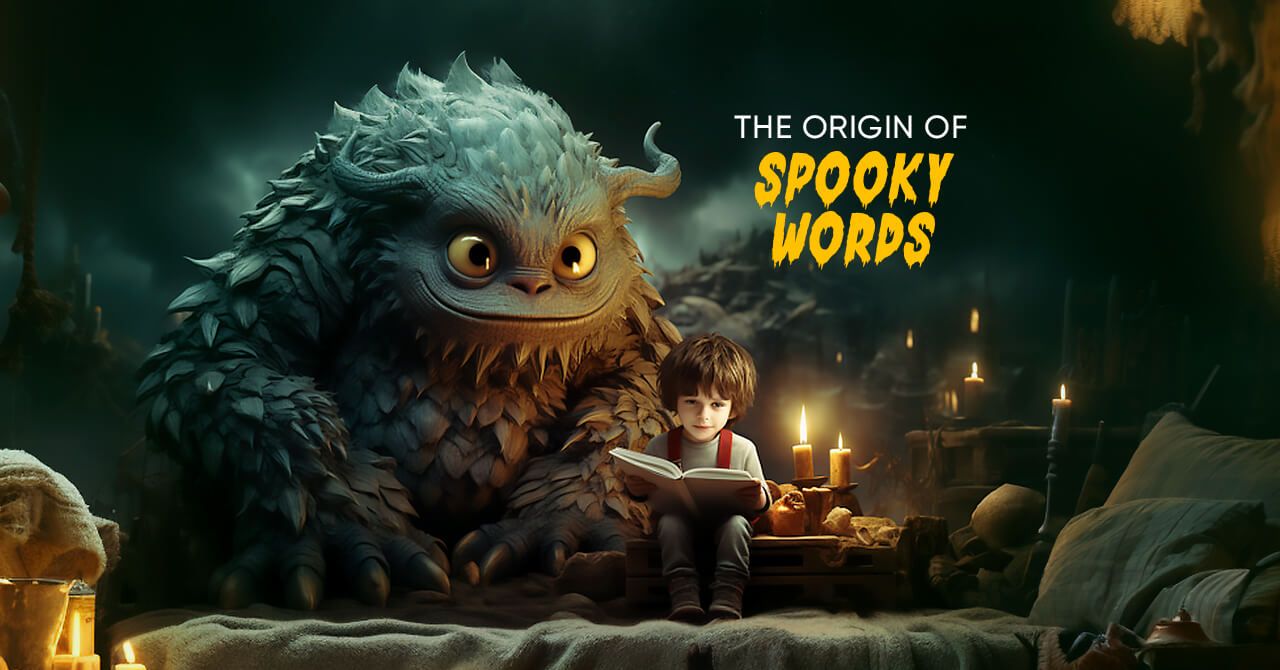
Halloween Spooky Words Origins🎃: Scary Etymology
Want to learn about the holiday and its spooky words’ origin? Then, you are on the right page.

Get a FREE guide!
Want to sound like a native English speaker?
Get our free PDF with top tips that work.

Check your email!
Halloween is the only holiday where you can pretend to be anyone other than yourself—a ghost, a character from your favorite movie, a book, or even a household item; the possibilities are endless on this holiday. The last day of October is for themed parties with little kids and teenagers going from door to door trick or treating the neighbors, but it wasn’t always like that.
Many holidays started as a tradition for a group of people in the past, and Halloween is no different. The holiday was formerly a part of the defining culture of the Celtics long ago before the Christians adopted it. It was renamed and evolved into our modern-day celebrations with unique words and grammar constructed for the occasion. Want to learn about the holiday and its spooky words’ origin? Then, you are on the right page.
It all starts with the Celtics
The Celts were a collection of tribes who lived 2000 years ago in Central Europe, sharing similar religious beliefs, culture, language, and tradition. A part of the Celtics’ tradition was celebrating a new year at the start of winter, which falls on the modern calendar as the 1st of November. This festival was called the Samhain, and rites were held as a transition from warm summer to winter.
The Celtics associated winter with the death of crops and humans as they were known to believe that the boundary separating the realms of the living and dead became distorted, allowing ghosts to enter the human world. The people were also ones who depended on what the earth provided for sustenance, so they held faith that this was a time to get predictions of their days in the New Year.
They built large sacred bonfires, bringing crops and animals to be offered to the Celtic gods. During the festival, they would wear costumes made of animal skins and heads; no doubt, this is where the tradition of costumes on Halloween was born. But how did the festival change from the Samhain to Halloween? This leads us to Roman All Saint’s Day.
All Saint’s Day
The Romans had a transforming influence on the Celtic Winter festival called Samhain, and it all began with the dedication of a pantheon. Pope Boniface IV, on the 13th of May, 609 A.D., dedicated the pantheon in Rome to honor all Christian saints, acknowledging the sacrifice they paid for the gospel to be preached to the corners of the earth. This dedication was celebrated as the feast of All Martyrs Day in the Western Church. Some years later, All Martyrs Day was extended to include all the martyrs and saints of the gospel. The festival was renamed All Saint’s Day by Pope Gregory III, and the date was changed to the 1st of November.
This new holiday did not share the same purpose as Samhain. Still, the celebration was similar—the people dressed as angels, saints, or demons instead of wearing heads and skins of animals, lit large bonfires, and held parades to celebrate.
All Saints’ Day became a holiday celebrated by the Romans and the Celtics, with the Roman Empire having conquered most of the Celt territory. People often ask what another term for Halloween is; the holiday was initially called “Alholowmesse,” which translates to Allhallows or Allhallowmas, another term for Halloween. The night before the celebration was the Samhain night for the Celts, and it was renamed All-Hallows Eve and, over the years, morphed into Halloween.
Halloween in modern-day
Fast forward to the 18th century, Halloween celebrations were not as popular, especially in England, but along came a group of European ethnic groups and American Indians who were able to create a distinct version of Halloween in America. People came together to celebrate the year’s harvest by having parties with their neighbors, sharing tales of the dead, and telling each other’s fortunes, usually accompanied by singing and dancing. By the 19th century, the holiday still wasn’t widespread, but that would all change with the immigration of millions of Irish people fleeing the famine in their country.
Americans soon began to wear costumes like the Romans to celebrate Halloween, and they also went from one house to the next asking neighbors for food or money and later changed to candy, which we now call trick or treating. However, in the late 1800s, there was an effort to restructure Halloween into a holiday less focused on spirits and witchcraft activities to a communal gathering instead. This would involve adults and children celebrating the holiday with games, food of the season, and costumes instead of focusing on pranks, ghosts, and witchcraft.
Want to know more? Start learning languages on LiveXP!
Halloween words and their origins
Although Halloween was supposed to be a communal gathering, they couldn’t stop everyone from playing pranks and using scary concepts. Pranks were still played, and people dressed up as ghosts or much scarier creatures this time of year; soon, many new words were dedicated to Halloween language. Here are some spooky word origins of Halloween.
Haunt
“Haunt” is a word of Old French origin from “hanter,” whose meaning was “to visit frequently.” It usually refers to a ghost or spirit lingering in the living world and taking abode in a particular location, such as a house, school, or even a bridge, only manifesting at night. And because Halloween is the holiday dedicated to all things scary, it is no surprise that it was added to the vocabulary. The word “haunt” has been put into many creative uses, generating haunted house themes that are said to be afflicted with the spirit of the dead.
Boo!
The first word a ghost or anyone trying to cause you fright will most likely shout is “boo!” It is very inappropriate that ghosts should have a catchphrase when haunting people, but time and the media have made us accept that they might as well do, and “boo” is the least terrible choice. This spooky word’s origin dates so far back that etymologists found it challenging to find when it was invented; however, they tried to trace it to the Ancient Greek word boaein, which means “to cry aloud,” but it was a long stretch. “Boo” can be found in texts going back to the 15th century and was written as “bo” or “boh,” but in the 19th century, the word acquired a new spelling and a slight change in meaning.
Monster
Some would describe a creature with terrifying attributes as a monster; however, the word was created as a bad omen. The word monster is derived from the French word monstre, which evolved from the Latin word monstrum, used to describe a deformed creature. Before its use in Latin, the earliest meaning of monstrum was “bad omen,” which refers to abnormal animals missing body parts like a leg or an eye. In the 14th century, monstre was used to refer to a mythical creature in stories, and it wasn’t until the 1550s before monster became a word to describe evil people.
Jack-O-Lantern
Jack-o-lanterns are popular striking symbols of Halloween, as the holiday would not be complete without the scary faces of the pumpkins. It is said that the tradition of carving out scary faces in vegetables all started as a way to scare off evil spirits, but this is just one of the many folklores that surround the history of the Jack-o-lantern.
The origin of the Halloween language is found in 17th-century Britain, where the term Jack-o-lantern refers to the night watchman who carried a lantern as he patrolled the streets. By the 19th century, the Jack-o-lanterns were known for something quite different from a watchman’s lamp. Children had begun to carve faces in tulips to scare people; these became very popular and were named Jack-o-lanterns, and soon, there was a transition from tulips to the now-symbolic pumpkins.
Spooky
The origin of the word spooky is the Dutch word for apparition, and it was first used in English around the 19th century. In just a matter of decades, it had developed into many forms – the verb to spook, spooked, and spooky, which was a good thing. The word was soon used to refer to black people, and it first started in the Tuskegee Institute, where black Army pilots –were called “Spookwaffe”, and waffe was a German word meaning weapon. From the army to literature, spook was slowly becoming a term for black people, but it wasn’t getting much love from people, especially the black community. Spooky is no longer a term for black people; it has found new meaning as it now refers to scary situations or objects.
Conclusion
Halloween is a time to spend with family and friends, spreading the cheers and scares from jack-o-lanterns to ghosts, monsters, and witches as the holiday is filled with spooky words and themes and a rich history. Learning the history of one of the scariest holidays will help you appreciate the Halloween language. By studying the spooky word origin, you might have inspirations for your costume or a big prank for the celebration.
















